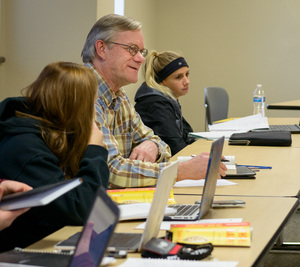Philosophy at CSC teaches students to question everything

CHADRON – In Dr. Brad Wilburn’s Philosophy classes at Chadron State College just about anything can get questioned. And for every question, there are many possible answers.
Wilburn, English and Humanities Professor and Department Chair, who has taught at CSC since 2005, challenges students to think broadly about ideas and questions during his philosophy and logic courses.
“The interesting thing about philosophy is that it is a combination of deep, open ended questions that humans have asked for thousands of years and philosophers still wrestle with. That’s one aspect, but the other aspect of philosophy is how philosophers focus on reasons and arguments,” Wilburn said. “For philosophy it’s not just spinning an answer, it’s what sort of argument you can give for that answer. Philosophy methodology is important in terms of reason, logic and argumentation. So there’s a deep, open-ended aspect in terms of the questions, but there’s a very rigorous analytic side to philosophy.”
Aspects of the analytic side of philosophy is conveyed in Symbolic Logic (PHIL 333), which Wilburn will teach in the spring 2018 semester. Wilburn said symbolic or formal logic teaches students how to get at the form of an argument and learn the procedure themselves to prove complex arguments.
A logical argument can take several forms, but Wilburn shared a common example he uses in his class:
All humans are mortal.
Socrates is human.
Socrates is mortal.
Wilburn said that if first two sentences are true, then it’s logically impossible for the third sentence or conclusion to be false. He also said that when the first two sentences are presented, many people are able to fill in the final sentence because they innately possess logic.
“We all have the ability to use logic and process arguments, it’s part of our mental tool kit. Philosophy teaches you to use both sides of your brain,” Wilburn said.
The Symbolic Logic course is rooted in the Humanities because it helps students make sense of the world while broadening their intellectual curiosity.
“Philosophy goes back to the idea that this is what humans do – we think about stuff. Our evolutionary advantage is the brain we have. All the activities we engage in and everything we create is the result of a lot of human thinking. Thinking is fundamental to whom we are as humans,” Wilburn said. “What philosophers are engaged in is thinking about thinking. We are examining this fundamental aspect of how we operate.”
Symbolic Logic isn’t the only Philosophy course CSC offers. Introduction to Philosophy, Classical Chinese Philosophy, Ethics, Biomedical Ethics and Environmental Ethics, among others, are offered to students. In order for a student to earn a minor in Comparative Philosophy, he or she must complete three Philosophy courses and 12 other credits from a list of 11 classes.
Wilburn said students have expressed a renewed interest in obtaining a minor in Philosophy. He also said it’s a recommended minor by CSC’s Legal Studies department because Philosophy students do well on the Law School Admission Test (LSAT).
“If you take a philosophy course you’ll have better skills at thinking, writing carefully and evaluating arguments,” he said. “If you go through a class questioning your assumptions, you get good thinking about the questions that are out there. That is a genuine job skill. Any sort of job that you’re going to get with a college degree, the employer wants the employee to think for themselves.”
Philosophy at CSC is also part of the Essential Studies Program and fosters an interdisciplinary approach to learning.
“Philosophy will help teach you to think outside the box, question assumptions, ask for arguments, and evaluate arguments. These are really basic skills that are important to learn they work so well with every other discipline,” he said.
Category: Campus News
